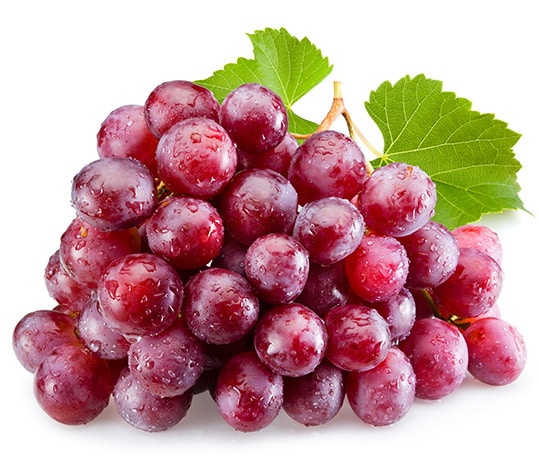ประโยชน์ของสารสกัดจากเมล็ดองุ่น
1. ลดการสะสมของโคเลสเตอรอลในผนังเส้นเลือดทำให้เส้นเลือดไม่ตีบตัน ลดการอุดตันของเส้นเลือด
2. มีผลต่อกล้ามเนื้อหัวใจ โดยทำให้กล้ามเนื้อหัวใจแข็งแรง และทนทานต่อภาวการณ์ขาดเลือดและลดการเต้นผิดจังหวะ มีผลทำให้ลดอัตราการตายจากโรคหัวใจ
3. มีผลยับยั้งเซลล์มะเร็งหลายชนิด เช่น มะเร็งกระเพาะอาหาร มะเร็งต่อมลูกหมาก และมะเร็งเต้านมในคน
4. สามารถป้องกันเซลล์มะเร็งในช่องปาก จมูก หลอดอาหาร ในกลุ่มประชากรที่เคี้ยวใบชาซึ่งเสี่ยงต่อการเป็นโรคมะเร็งชนิดนี้
การรับประทานผักและผลไม้ที่มีเบต้าแคโรทีน วิตามิน ซี และวิตามิน อี สูง สามารถที่จะลดอุบัติการณ์การเป็นมะเร็งเต้านมและมะเร็งปอด และยังลดอุบัติการณ์ของโรคหัวใจขาดเลือด ทั้งหมดนี้มีงานวิจัยสนับสนุนในประชากรนับหมื่นคน กล่าวโดยสรุปแล้ว สารต้านอนุมูลอิสระมีผลต่อร่างกาย เป็นสารธรรมชาติที่ช่วยชะลอการแก่และลดมะเร็งต่างๆ และลดอุบัติการณ์ของโรคหัวใจขาดเลือดได้จริง มีมากในผักและผลไม้หลายชนิด ซึ่งอาจจะหารับประทานได้ไม่ยาก
สารสกัดจากเมล็ดองุ่นเป็นสารประเภทไบโอฟลาโวนอยด์ มีสารที่สำคัญหลายตัวเป็นกลุ่มของโปรแอนโทรไซยานิดิน (Proanthocyanidin) หรือมีอีกชื่อว่า พีซีโอ (PCO : Procyanidolic Oligemars) มีประสิทธิภาพต้านอนุมูลอิสระ สารพีซีโอตัวนี้มีมากที่สุดในเมล็ดองุ่น บลูเบอรี่ เชอรี่ พลัม ถั่ว และผักบางชนิด
เอกสารอ้างอิง
1. Grape seed proanthocyanidins improved cardiac recovery during reperfusion after ischemia in isolated rat hearts.
Am J Clin Nutr 2002 May;75 (5) :894-9.
2. Proanthocyanidin-rich extract from grape seeds attenuates the development of aortic atherosclerosis in cholesterol-fed robbits.
Atherosclerosis 1999;142 (1):139-49
3 Grape seed proanthocyanidins improved cardiac recovery during reperfusion after ischemia in isolated rat hearts.
Am J Clin Nutr 2002 May;75 (5) :894-9.
4. Free radicals and grape seed proanthocyanidin extract: Importance in human health and disease prevention.
Toxicology 2000 Aug 7;148 (2-3) :187-97
5. Anticarcinogenic effect of a polyphenolic fraction isolated from grape seeds in human prostate carcinoma DU145 cells: modulation of
mitogenic signaling and cell-cycle regulators and induction of G1 arrest and apoptosis. Mol Carcinog 2000 Jul;28(3):129-38
6. A polyphenolic fraction from grape seeds causes irreversible growth inhibition of breast carcinoma MDA-MB468 cells by inhibiting
mitogenactivated protein kinases activation and inducing G1 arrest and differentiation. Clin Cancer Res 2000 Jul;6(7):2921-30
7. Protective effects of antioxidants against smokeless tobacco-induced oxidative tress and modulation of Bcl-2 and p53 genes in human oral
Keratinocytes. Free Radic Res 2001 Aug;35(2):181-94
8. Relationship between the intake of high-fiber foods and energy and the risk of cancer of the large bowel and breast.
Eur J Cancer Prev 1998;7 Suppl 2:S11-7:S11-7
9. Protective effect of fruits and vegetables on stomach cancer in a cohort of Swedish twins. Int J Cancer 1998;76(1):35-7.
10. Dietary factors and risk of lung cancer in never-smokers. Int J Cancer 1998;78(4):430-6
11. Vegetableand fruit intake and the risk of lung cancer in women in Barcelona, Spain. Eur J Cancer 1997;33(8):1256-61.
12. Intake of vitamins E, C, and A and risk of lung cancer. The NGANES I epidemiologic follow-up study. First National Health and Nutrition
Examination Survey. Am J Epidemiol 1997;146(3):231-43
13. Dletary carotenoids and vitamins A, C, and E and risk of breast cancer. J Natl Cancer Inst 1999;91(6):547-56.
14. Vegetable and fruit consumption and prostate cancer risk: a cohort study in The Netheriands. Cancer Epidemiol Biomarkers Prev
1998;7(8) :673-80
15. Fruit and vegetable intake and incidence of bladder cancer in a male prospective cohort. J Natl Cancer Inst 1999;91(7):605-13.
16. Dietary antioxidants and risk of myocardial infarction in the elderly; the Rotterdam Study. Am J Clin Nutr 1999;69(2):261-6.


